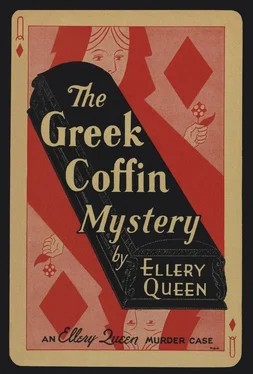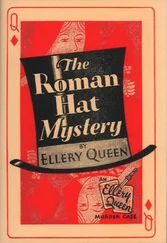“Oh, do stay, Doctor!” shrilled Mrs. Sloane. “Don’t leave us in this dreadful time. You’ve been so kind...”
“Yes, do, Doctor.” This was a new voice, and it proceeded from the deep chest of a large handsome woman — a dark bold beauty. The physician bowed and murmured something inaudible, and Velie said nastily, “And who are you, Madame?”
“Mrs. Vreeland.” Her eyes sparked warning; her voice had coarsened, and Joan, perched on the edge of Khalkis’ desk in woeful resignation, swallowed a smile bravely; her blue eyes went appraisingly to Dr. Wardes’ powerful shoulder-blades. “Mrs. Vreeland. I live here. My husband is — was — Mr. Khalkis’ traveling representative.”
“I don’t get you. What do you mean — traveling representative? Where is your husband, Madame?”
The woman flushed darkly. “I don’t like your tone! You have no right to speak to me in such a disrespectful tone!”
“Can it, sister. Answer my question.” Velie’s eyes grew cold, and when Velie’s eyes grew cold they grew very cold indeed.
The little mutter of anger sputtered away. “He’s — he’s in Canada somewhere. On a scouting trip.”
“We tried to locate him,” said Gilbert Sloane unexpectedly. His pomaded black hair, small mathematical mustache, pouched watery eyes gave him an incongruously dissipated appearance. “We tried to locate him — the last we heard, he was operating from Quebec as a base, on the trail of some old hooked rugs he’d heard about. We haven’t heard from him yet, though we left word at his last hotel. Perhaps he’ll see the news of Georg’s death in the papers.”
“And perhaps he won’t,” said Velie shortly. “Okay. Dr. Wardes, you staying?”
“Since I am requested to do so — yes. I shall be very happy to.” Dr. Wardes moved back and contrived to stand near Mrs. Vreeland’s stately shape.
Velie looked at him darkly, motioned to Pepper and they walked out into the corridor. Woodruff almost trod on their heels, he followed so quickly. Every one shuffled out of the library and Pepper shut the door carefully behind him. Velie said to Woodruff, “What’s on your mind now, Woodruff?”
They had turned to face him near the foyer door. The lawyer said in a sharp tone, “Look here. Pepper saw fit to accuse me of an error in judgment a while ago. I’m not taking any chances. I want you to search me too, Sergeant. Yourself. I wasn’t tackled in there, you know.”
“Now, don’t take it that way, Mr. Woodruff,” said Pepper in a soothing voice. “I’m sure it isn’t—”
“I think it’s a damned good idea,” said Velie unpleasantly. Without ceremony he gave Woodruff such a pounding, scraping and pinching as Woodruff, to judge from his expression, had hardly anticipated. And Velie went very carefully indeed through all the papers the lawyer had in his pockets. Finally, he surrendered his victim. “You’re clean, Woodruff. Come along, Pepper.”
Outside the house they found Flint, the brawny young plainclothesman, bantering with the dwindled group of reporters, a handful clinging tenaciously to the sidewalk gate. Velie promised Flint a relief for himself and Johnson in the rear, and for the matron he had left inside, and doggedly plowed through the gate. Like a cloud of gnats the reporters swarmed about him and Pepper.
“What’s the angle, Sarge?”
“What’s up?”
“Give us a break, you mug!”
“Come on, Velie, don’t be a thick flattie all your life.”
“How much was your cut for keeping quiet?”
Velie shook their hands off his big shoulders; and he and Pepper took refuge in a police car waiting at the curb.
“How’m I gonna tell the Inspector?” groaned Velie, as the car lurched forward. “He’ll crown me for this.”
“Which Inspector?”
“Richard Queen.” The sergeant stared morosely at the back of the chauffeur’s crimson neck. “Well, we did what we could. Left the house under a kind of siege. And I’ll send one of the boys over to look at the safe for fingerprints.”
“Much good that’ll do.” Pepper’s brightness had dissipated; he sat gnawing a fingernail. “The D.A.’ll probably give me hell, too. I think I’ll stick pretty close to the Khalkis house. Drop in to-morrow to see what’s doing, I will. And if those palookas in the house want to make trouble about our restricting their movements that way—”
“Aw, nuts,” said Velie.
On Thursday morning, which was the seventh of October, and a singularly cheerless day, District Attorney Sampson called a council of war. It was on this day, then, that Ellery Queen was formally introduced to the perplexing riddle that eventually came to be known as “The Khalkis Case.” It was a younger and cockier Ellery; and, since his connection with the policing of New York City was not so firmly established at this time, he was still considered something of an interloper despite his unique position as the son of Inspector Richard Queen. Indeed, it is to be suspected that the good grey Inspector himself had good grey doubts concerning Ellery’s covenanted ability to combine pure reason with practical criminology. The few isolated cases to which Ellery had applied his still formative faculties of deduction, however, had established a precedent which accounted for his cool assumption that he too was meant to be a councilman when District Attorney Sampson sounded the tocsin.
Truth to tell, Ellery had heard nothing whatsoever about Georg Khalkis’ death, and considerably less about the stolen will. Consequently, he disturbed the District Attorney by questions to which every one present, save Ellery himself, knew the answers. The District Attorney, not yet the tolerant colleague he was in later years to become, was distinctly irritated. The Inspector himself was annoyed and said so in no uncertain terms, and Ellery sank back on his spine in one of Sampson’s best leather chairs, a trifle abashed.
They were very solemn. There was Sampson, almost at the outset of his prosecutor’s career, a thin and deceptively sturdy man in his prime — bright-eyed and eager, and not a little upset by this waspish problem that seemed so ridiculous until it was examined closely. There was Pepper, the intelligent Pepper, one of Sampson’s staff of prosecutors, a political appointee, his whole husky healthy body portraying despair. There was old Cronin, Sampson’s First Assistant District Attorney, much more mature in criminal wisdom than his two colleagues; a veteran of the office — red-haired, nervous, springy as a colt and wise as an old roan. There was Inspector Richard Queen, already grey, more bird-like than ever, with his little sharp withered face and thick grey hair and mustache — a slender little old man with a quaint taste in cravats, the potential resiliency of a greyhound and a vast knowledge of orthodox criminalism. He was toying in exasperation with his old brown snuff-box.
Then, of course, there was Ellery himself — Ellery the temporarily chastened. When he made a point, he brandished the winking lenses of his pince-nez eyeglasses. When he smiled, it was with his whole face — a very good face, it has been said, with long delicate lines and the large limpid eyes of the thinker. Otherwise, he was much like other young men whose memories of their Alma Mater are not yet mildewed: tall and spare and square-shouldered and not unathletic. At the moment he was watching District Attorney Sampson, and District Attorney Sampson felt distinctly uncomfortable.
“Well, gentlemen, we’re up against the old story,” muttered Sampson. “Lots of leads, but no goal in sight. Well, Pepper, is there anything else you’ve discovered to confound us?”
“Not a solitary thing of importance,” replied Pepper dolefully. “I naturally tackled this Sloane fellow the first chance I got — alone. He’s the only baby who stood to lose by the new Khalkis will. Well, Sloane shut up like a Bluepoint — refused to talk at all yesterday. What could I do? We haven’t any proof.”
Читать дальше












